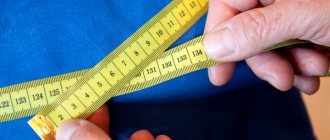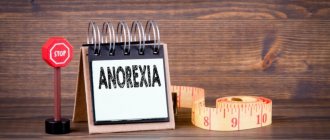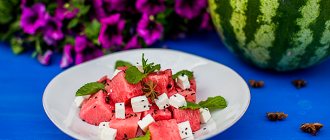- June 13, 2019
- Mental disorders
- Valeria Dashkevich
We hear these two words: “proper nutrition” from every “iron” and for some reason we firmly believe that this is a complex and not the most pleasant process. But if you ask the question, is it worth it, then the answer is clear - yes! And you need to think about this not only for those who want to get rid of extra centimeters at the waist, but also for those who want to improve their health, tone the body, charge themselves and everyone with a good mood.
It is important before starting a difficult path to clearly understand that quick results are not the story. Proper nutrition is not a temporary diet, but a way of life. And its principles must be introduced gradually so that life sparkles with new colors. How to start eating healthy from scratch?

Don't be lazy to write everything down
Simply put, keep a food diary and write down everything you eat, every crumb of bread. Such a system will help systematize your diet, understand how you eat and what you are doing wrong. By visualizing your nutritional principles, you can adjust your diet depending on your goals. But this rule will only have results if you keep a diary on a regular basis. You will be able to determine what you are missing in your diet and what you should give up after a couple of weeks of systematically keeping a diary.
Don't throw yourself into the pool headlong
How to limit yourself in food during the day? Trying to change your lifestyle and implement all the rules of proper nutrition in one day is a “lost task”, which in most cases is doomed to failure. To achieve the desired result and not give up halfway through, you should change your eating habits gradually, because they were also developed not in one day, but throughout your entire life. If you have never eaten half a kilogram of vegetables, then doing this on the first day will be very difficult. Add the right foods to your diet gradually. Only then will you remain motivated every day, since your well-being and external condition will only improve every week.
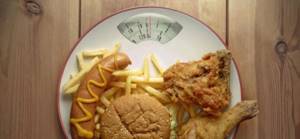
Control, control and more control!
How to limit yourself to food in the evening? Our task is not only to eat right, but also to avoid overeating. To do this, you need to control portion sizes. Leave large plates on the far shelf, buy dishes that will please the eye, and the portion on them should fit the size of your palm. Eat exactly the amount of food you need. The control rule also applies to the number of calories consumed. The main rule of weight loss is a calorie deficit. Overeating is always discomfort and does not make you feel the best. Consume exactly as many calories as you need.
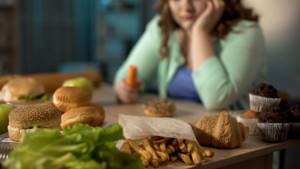
Three popular weight loss strategies
Cut calories.
Some experts believe that successful weight management comes down to a simple equation: if you eat fewer calories than you burn, you'll lose weight. Sounds simple, right? Then why is it so hard to lose weight?
- Weight loss is not a linear phenomenon over time. When you cut calories, you may lose weight for the first few weeks, for example, and then things will change. You consume the same amount of calories, but lose less or no weight. This is because when you lose weight, you lose water and lean tissue as well as fat, your metabolism slows down and your body changes. So, to continue losing weight each week, you need to keep cutting calories.
- Calories are not always calories. For example, eating 100 calories of high fructose corn syrup will have a different effect on your body than eating 100 calories of broccoli. The trick to sustainable weight loss is to eliminate foods that contain calories but don't make you feel full (like candy) and replace them with foods that fill you up without the calories (like vegetables).
- Many of us don't always eat just to satisfy our hunger. We also turn to food for comfort or to relieve stress, which can quickly derail any weight loss plan.
Avoid carbohydrates.
Another way of looking at weight loss identifies the problem not as consuming too many calories, but rather in how the body stores fat after eating carbohydrates—specifically, the role of the hormone insulin. When you eat, carbohydrates from your food enter your bloodstream as glucose. To control your blood sugar levels, your body always burns this glucose before it burns fat from food.
If you eat a meal rich in carbohydrates (like a lot of pasta, rice, bread or French fries), your body produces insulin to help with the flow of all that glucose into the blood. In addition to regulating blood sugar, insulin does two things: it prevents fat cells from releasing fat for the body to burn as fuel (since its priority is burning glucose) and it creates more fat cells to store whatever is in your body. As a result, you gain weight and your body needs more fuel to burn, so you eat more.
Most low-carb diets recommend replacing carbohydrates with protein and fat, which can have some negative long-term effects on your health.
Avoid fat.
This is the basis of many diets: if you don't want to gain weight, don't eat fatty foods. Walk down the aisle of any grocery store and you'll be bombarded with reduced-fat products. But even as our low-fat options have skyrocketed, so has obesity. So why haven't low-fat diets worked for most of us?
- Not all fat is bad. Healthy or “good” fats can actually help control your weight, as well as manage your mood and fight fatigue. Unsaturated fats found in avocados, nuts, seeds, soy milk, tofu and fatty fish can help fill you up, and adding a little tasty olive oil to a plate of vegetables, for example, can make it easier to eat healthy and improve the overall quality of your diet.
- We often make the wrong compromises. Many of us make the mistake of replacing fat with other calories from sugar and refined carbohydrates. For example, instead of eating full-fat yogurt, we eat low-fat versions with sugar to compensate for the loss of flavor. Or we swap greasy bacon for breakfast for a muffin or donut, which causes our blood sugar to spike.
We pass by low-fat products and go for fruit
How to limit yourself in food during the day? Many people who are losing weight, as soon as they see the inscription “0% fat”, sweep such products off the shelves. But it has long been proven that most of these products have absolutely no benefit to the body. This is explained quite simply: in order to reduce the percentage of fat content, for example, in milk, you need to add something (obviously unhealthy) to it, which will affect the composition.
As for fruits. If there are not enough of them in your daily diet, then this matter urgently needs to be corrected. After all, even one green apple contains the daily human requirement of vitamins. In addition, many fruits are quite sweet, and this is a real salvation for those who like to pamper themselves with confectionery.
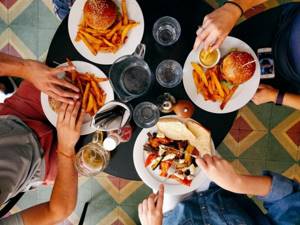
And nowhere without vegetables and whole grains!
Many who dream of an ideal figure will completely exclude carbohydrates from their diet. And this is a big mistake, we need carbohydrates, but only complex ones, not simple ones. The ideal option is porridge and whole grain products. They not only help digestion work, speed up metabolism, but also contain a sufficient amount of B vitamins. The same applies to vegetables - they are simply irreplaceable! They contain a large amount of fiber, which is so necessary for our body to function properly. Nutritionists advise making a choice in favor of green vegetables. This could be spinach, broccoli, or regular cucumbers. Vegetables are a great reason to let your imagination run wild, because you can eat them in any form. Bake, stew, make fresh salads and even smoothies.

Add fruits, vegetables and fiber to your diet
Even if you decide to cut back on calories, it doesn't necessarily mean you need to eat less food. High-fiber foods like fruits, vegetables, beans and whole grains have more bulk and take longer to digest, making them filling and great for weight loss.
It's usually okay to eat as much fresh fruit and non-starchy vegetables as you want— you'll feel full before you overdo the calories.
Eat vegetables raw or steamed rather than fried or breaded, and dress them with herbs and spices or a little olive oil.
Add fruit to low-sugar porridge - blueberries, strawberries, sliced bananas. You'll still enjoy the sweetness, but with fewer calories, less sugar, and more fiber.
Increase the volume of sandwiches. For many, it is a problem to give up a snack or breakfast with their favorite sandwiches. Add healthy vegetables such as lettuce, tomatoes, sprouts, cucumbers and avocados.
Add more vegetables to your favorite main dishes for a richer meal. Even pasta and stir-fries can be healthy if you use less noodles and more vegetables.
Snack on carrots or an apple instead of high-calorie chips and dip.
Start your meal with a salad or vegetable soup to fill you up and eat less of the main course.
What to do with salt and sugar?
One of the first rules of healthy eating is to minimize salt intake. But to prevent the food from being bland, add spices and herbs to your dishes. And different oils add interesting flavors to food that will delight your taste buds better than any salt. What is its harm? Excess salt in the body retains excess water, and as a result, we get new numbers on the scales that are not at all encouraging. But this is not the biggest problem; excessive salt consumption can cause certain diseases of the cardiovascular system and kidneys.
It is also worth reducing the amount of sugar consumed. Often we don't even realize how much glucose is entering our body. For example, store-bought packaged juices contain two or even three times more sugar than freshly squeezed juices. If you're used to adding sugar to everything you eat, you'll have to find a healthy alternative. The simplest option is honey and homemade jam.
How to limit yourself in food during the day?
Introducing proper nutrition into your life is not as difficult as it might seem at first glance. Limiting food during the day can be just as difficult as in the evening. This question was thoroughly studied by Brian Wansink, a professor at Cornwall University. The scientist has compiled a list of simple rules that will help you control yourself:
- Use only small dishes. This rule seems elementary, but it works flawlessly. Experiments have proven that if you reduce the diameter of the plate by just a couple of centimeters, the portion sizes consumed will be reduced by 22%. At the same time, a person will not feel hungry, because we all eat with our eyes first. And this is pure psychology, if plates of different sizes have the same contents, then a person will feel like there is less food on the larger plate, which means we won’t be able to feel full and will have to look for reassurance in some snacks.
- Even the color of the plates matters! Studies have shown that the brighter the dishes, the smaller the portion you will put on them. The most dangerous are white plates, because a person unconsciously tries to fill this emptiness to the maximum. The experiment showed us the following figures: the same people put approximately 15% less food on bright red and blue plates than on their white counterparts.
- How to limit yourself in food during the day? Golden rule: always have clean water at hand. We sometimes don’t even pay attention to how many unnecessary drinks we consume during the day. Tea, coffee, juices, soda - anything goes, but not drinking water.
- We have already learned that we start eating with our eyes even before the first bite enters our mouth. That is why you need to arrange food in the refrigerator so that the right food is immediately in front of your eyes.
As you can see, the principles of proper nutrition are not based on strict prohibitions. If you really want to, of course, you can limit yourself to your favorite foods, you can try to forget about cakes and sweets. But every person who has been on a strict diet at least once in his life knows that in most cases a breakdown cannot be avoided. Don’t base your new lifestyle on prohibitions; it’s better to try to deceive yourself, let healthy food always be in sight, then it will be easier to lose weight.
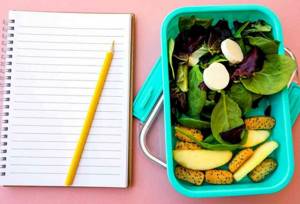
Take responsibility for your food environment
Set yourself up for weight loss success by taking charge of your food environment: when you eat, how much you eat, and what foods you make readily available.
Prepare your own food at home. This allows you to control both the portion size and what ingredients go into the dish. Restaurant and packaged foods typically contain much more sugar, unhealthy fats, and calories than home-cooked foods.
Use small plates, bowls and cups to make portions appear larger . Avoid eating from large bowls or directly from food containers, as this makes it difficult to judge how much you have eaten.
Eat early. Research shows that eating more daily calories at breakfast and fewer at dinner can help you lose more pounds. A hearty, healthy breakfast can speed up your metabolism, keep you from feeling hungry throughout the day, and give you more time to burn calories.
Drink more water. Thirst can often be confused with hunger, so drinking water can help you avoid extra calories.
- Start your day with a glass of water - it will launch metabolic processes;
- Drink a glass of water 15–20 minutes before your meal;
- Always keep a bottle of plain water next to you so that you can quench your thirst at any time without interrupting your work;
Learn more about how much and when to drink water.
Limit the number of tempting foods you have in your home. If you share a kitchen with people who aren't on a diet, ask them to keep tasty foods out of your sight.
Binge eating
Does it ever happen to you that you start eating and can’t tell yourself “enough” in time? If the answer to the question is yes, then most likely the whole problem is compulsive overeating. Simply put, we are dealing with psychological hunger, when we don’t just eat to live, but begin to “eat” our bad mood, problems and stress.
Any nutritionist will tell you that overeating is the norm for every person. This becomes a problem when a person with enviable regularity stops monitoring the amount of food consumed. Then food turns into a way to overcome all internal negativity. Compulsive overeating is characterized by the fact that a person often thinks only about food, constantly feels hungry, therefore eats several times more than he should and after eating does not feel satisfaction, but shame and guilt. Overeating and bulimia go hand in hand. If you don’t start dealing with the problem at its roots, you can end up with a serious psychological disorder.

How to Control Emotional Eating
We don't always eat just to satisfy our hunger. Too often we turn to food when we feel stressed or anxious, which can ruin any diet and result in weight gain. Do you eat when you're worried, bored or lonely? Do you snack in front of the TV at the end of a busy day? Recognizing your emotional food triggers can make all the difference in your weight loss efforts. If you eat when:
- When stressed , find healthier ways to calm down. Try yoga, meditation, or a hot bath.
- Fatigue - find entertainment in the middle of the day. Try walking around the block, listening to uplifting music, or taking a short nap.
- Loneliness or boredom - turn to friends, not to the refrigerator. Call a friend who makes you laugh, take the dog for a walk, or go to the library, mall, or park—anywhere there are people.
Practice Mindful Eating Instead
- Avoid distractions while eating. Try not to eat while working, watching TV, or driving. It's too easy to mindlessly overeat.
- Pay attention: Eat slowly, enjoying the smell and texture of the food. If you get distracted, gently bring your attention back to your food and its taste.
- Try using chopsticks rather than a fork, or using cutlery with your non-dominant hand.
- Stop eating before you're full. It takes time for the signal to reach your brain that you've had enough.
Psychology: how to stop overeating?
Before the problem gets completely out of control, you can try to solve it on your own, without turning to a psychologist for help. Take note of the following rules that will help you overcome the urge to overeat and get rid of gluttony:
- Stop dividing everything around into good and bad. A positive attitude towards yourself will help you get on the path to recovery at almost any stage of the development of the problem. Just stop dividing food into good and bad, any dish can be healthy, even a piece of your favorite cake, if you know the measure.
- Don't sweep away everything on the way indiscriminately, take breaks. This is necessary in order to ask yourself the question: do I really still feel hungry? Psychosomatics studies overeating - this is a special direction in medicine. It is possible that your brain has been trying to tell you for a long time that you are already full.
- Allow yourself to relax. Prohibitions will lead to overeating in a day, two, a month, this is inevitable. Accept this fact and move on. If you want a piece of barbecue or candy, just allow yourself to eat a little and don’t dare regret it.
- Overeating and strict diets go hand in hand in life. A lot of restrictions mean stress, both psychological and physical. Outbursts of causeless aggression, irritability, and anxiety appear. How can we get rid of this discomfort? That's right, empty the entire contents of the refrigerator. And if you eat properly and nutritiously, the number of such outbreaks can be minimized.
Psychosomatics studies overeating at a serious level, because weight problems are primarily in our heads, and not in our stomachs. If the above tips do not help solve the problem, you will need the help of a specialist. Apart from medical issues, we all know the other side of the coin. Have you asked yourself what kind of sin is gluttony? So, this is excess and greed in food, which has always been shameful. Now let's think: “Do we need it?”
Evening overeating
Many people don’t like to have breakfast, but for some reason everyone has dinner. According to many, you want to eat three times more in the evening than in the morning. Some people like to eat just before bed. Scientists have found that for only 1.5% of people, eating at night is a body need. For others, it's just a bad habit that you can get rid of.

Is it possible to eat in the evening?
The following fact is interesting. Previously, it was believed that late meals contribute to the most intense fat deposition. But research has refuted this assumption. Our body continues to absorb and burn calories, regardless of the time of day. For those who are losing weight, it is more important to maintain a calorie deficit and balance of food intake than a rigid meal schedule.
However, for a long time in history, the human body has adapted to an active lifestyle during the day, which is why our body, from birth, prepares for a large expenditure of energy at this time. At night, our body should rest, and not process food (calorizer). The greatest danger to your figure in the event of evening overeating lies in the sharp stimulation of insulin production, which helps preserve fat, so all the calories that you ate in excess of the norm in the evening are put into reserve. Along with weight, the likelihood of developing cardiovascular diseases and diabetes increases.
You can and should eat in the evening, but your last balanced meal should be planned 3-4 hours before bedtime. It should fit perfectly within your needs and be lightweight. Before going to bed, you can have a snack, which also should not add to your calorie intake. If you are in a calorie deficit, this food will not be stored as fat.
Many people make the mistake of adapting their rhythm of life to someone’s invented diet, in which you cannot eat after 6 p.m. or certain foods are prohibited. After a few days of a restrictive diet, a breakdown occurs, after which it is difficult to return to the regime.

Why shouldn't you eat in the evening?
The last meals should be light and dietary. No fatty meats, flour products, legumes. People suffering from gastrointestinal diseases are not recommended to eat raw vegetables, but only thermally processed ones.
Large late meals prevent your body from resting properly, leading to fatigue and lack of sleep, as the body is forced to work around the clock. This lifestyle is harmful to the gastrointestinal tract, because some foods that are harmless when consumed during the day turn out to be harmful when consumed in the evening or at night.
Probably, none of you wants to acquire a number of intractable diseases along with being overweight, right? Let's figure out how to get rid of this persistent habit so that our body does not work at night, but rests as it should. To do this, in this article we have highlighted 6 techniques so that you can choose them individually.

Techniques for breaking the habit of evening overeating
Dietary techniques
- Plan your diet. If your appetite appears in the evening, and in the morning you are not at all hungry, then you do not need to have a big breakfast. Make a light protein breakfast, and in the evening add a portion of complex carbohydrates to protein and vegetables. In your Personal Account, determine in advance what you will eat and in what quantity, so as not to go beyond the calorie limit;
- Make it a habit to have a low-fat snack at night. Eat 100 g of low-fat cottage cheese 1-2 hours before bedtime, drink kefir, fermented baked milk or tea with milk. You can add sweetener, cocoa, cinnamon or vanilla to fermented milk products;
- Diversify your diet. The more interesting the meal, the more flavor combinations it contains, the slower you eat, as you try each dish again every time. Most often people quit diets because they are boring and monotonous. But you already know how to count calories and know that as long as you are in a deficit, you are not in danger of gaining weight. Try new recipes, calculate KBJU in the recipe analyzer, create your database in your Personal Account and lose weight deliciously;
- Eat small dinners if you feel comfortable doing so. Before leaving work, have a light snack, such as cottage cheese, an apple, yogurt, a couple of crispbreads, etc. At home - also a light snack. In 20-30 minutes it’s actually dinner. Thanks to snacks, it is much easier to control yourself - you don’t pounce on food and overeat;
- Drink a glass of water or a cup of tea before meals. Liquid creates bulk in the stomach, so you end up eating less. The main thing is to measure out a small portion in advance and choose smaller plates. People who are overweight often don’t listen to their body’s signals and tend to eat everything on their plate. A liquid, a small portion and a small plate will help you outsmart yourself;
- Allow yourself treats in reasonable quantities. The stricter the ban, the stronger the rollback. Therefore, allocate 10% of your daily caloric intake for your favorite dessert that you can truly enjoy.

Behavioral techniques
- Take a walk before bed. Fresh air will help put your thoughts in order and calm down, but often this is exactly what we expect from the evening “glutton”;
- Please your body, not your stomach. For example, give preference to a fragrant bath instead of a cake with a cup of tea;
- Use the “Walk = Lose Weight” technique. It has been noticed that moderate intensity exercise improves mood and reduces appetite. A little physical activity stimulates the breakdown of fat, thereby reducing the need for food as a source of energy;
- Go to bed earlier. A well-rested person has a better mood, better insulin sensitivity, lower cortisol and a lower risk of overeating.

Psychological techniques
- Overeating is the fruit of the ban on overeating. Don't create restrictions for yourself. Not eating at night should be natural for your body;
- You know that you can do anything and food will not disappear from you anywhere. Make three lists: 1) what I want and can eat every day; 2) what can I eat in limited quantities; 3) that I shouldn’t eat yet. The first list is natural and healthy products from your daily diet, which you can diversify with products from the second (more often) and third (less often) lists. The main condition is to remain in a calorie deficit and balance the BZH;
- The one whose life is full of eventful events and worries, who has many interests, does not overeat. You can visit theaters, entertainment centers, and exhibitions. Make a list of 50 things that interest you and bring you joy (calorizator). It could be a walk in the park, a movie, your favorite music, a bubble bath, playing with a kitten - whatever. Every time you have a food craving, ask yourself what you really want. Perhaps the soul asks for dancing, but there is only cookies. Find time for your hobbies and activities that make you happy.

There are quite a few reasons for evening overeating. Each person is individual and everyone’s task is to find what will work specifically for them. Some techniques will suit some, others – others. There is no need to try to cover everything, take it gradually and see what you are comfortable with and brings results.
Author: Zhanna Sh. (especially for) Copying this article in whole or in part is prohibited.
